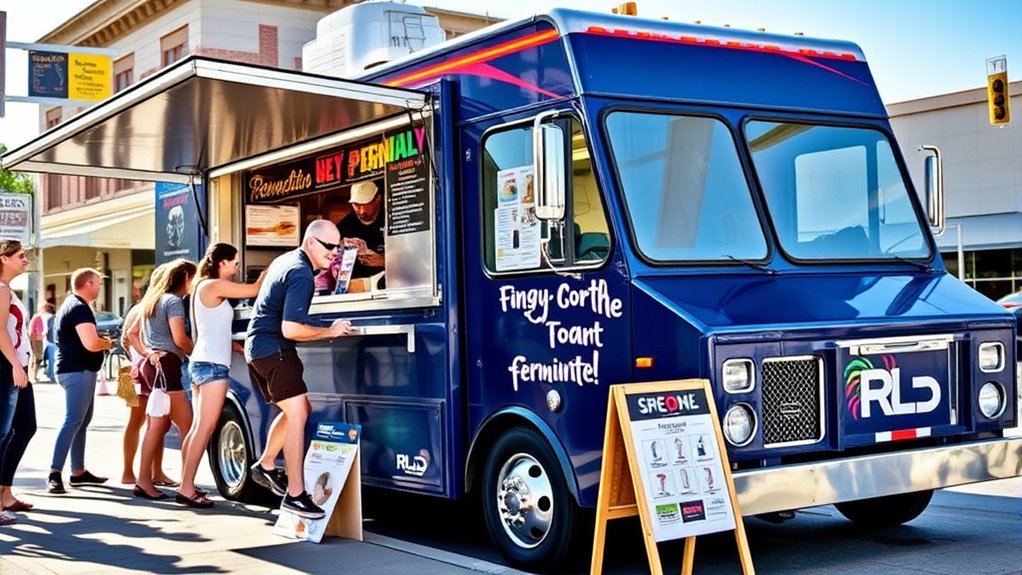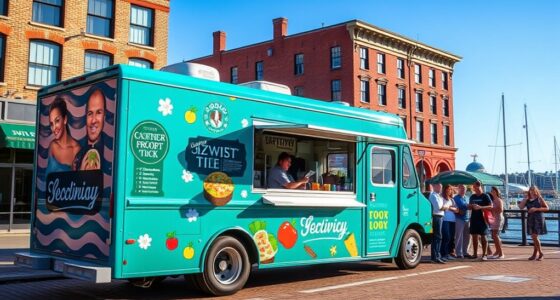To start a food truck in Minot, North Dakota, you need to obtain a mobile food license from the state health department and secure appropriate permits, which typically cost around $1,500–$2,000 annually. You’ll also need insurance coverage, vehicle registration, and parking permissions in high-traffic areas like parks or busy streets. Crafting a menu that meets health standards and targeted marketing will help attract customers. If you continue, you’ll discover detailed steps to make your food truck business successful.
Key Takeaways
- Obtain a North Dakota Department of Health mobile food license, complete a plan review, and pass pre-operational inspections.
- Budget approximately $1,500–$2,000 annually for permits, registration, insurance, and maintenance costs.
- Select high-visibility locations like parks, busy streets, and community events, ensuring compliance with zoning laws.
- Develop a menu catering to local tastes, and leverage social media, festivals, and loyalty programs for effective marketing.
- Maintain all licenses, insurance, and health standards to ensure ongoing compliance and build customer trust.
Navigating Permit Requirements and Licensing Processes

To operate a food truck in Minot, North Dakota, you need to navigate a series of permit requirements and licensing processes. First, obtain a mobile food license from the North Dakota Department of Health’s Division of Food and Lodging; other state licenses aren’t accepted. You’ll also need to submit a Food Establishment License Application and get approval for your written plan from health authorities before opening. A pre-operational inspection by health inspectors is mandatory to guarantee your truck meets safety standards. You must hold a sales tax license and include proof with your application. Additionally, your vehicle must be registered, insured, and compliant with North Dakota’s food safety codes, including the 2024 Food Code. Food trailers with GVWR ≥ 3,000 lbs require a separate braking system, and understanding local health department regulations is crucial to ensure full compliance. These steps ensure your mobile food operation is fully authorized and compliant with state and local regulations.
Understanding Costs, Fees, and Insurance Obligations
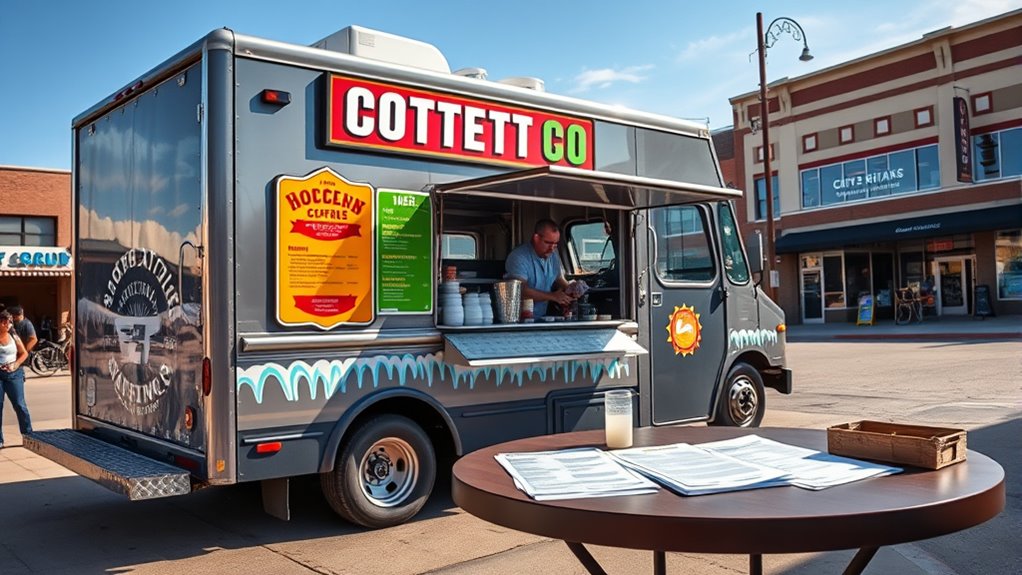
Understanding the costs, fees, and insurance obligations is essential before launching your food truck in Minot. You’ll need to budget for licensing fees, insurance coverage, and other ongoing expenses to stay compliant and protected. Being aware of these financial requirements helps you plan effectively and avoid surprises down the road. Proper insurance coverage is vital to safeguard your business assets and personal finances in case of accidents or liability claims. Additionally, understanding ethical hacking principles can help you identify potential cybersecurity vulnerabilities in your digital systems, ensuring customer data remains secure.
Licensing Fee Structures
Exploring the licensing fee structures for food trucks in Minot involves several key costs and obligations. You’ll pay varying fees depending on your operations. For example, a Park District Permit costs $120 per event, and annual Food Establishment Licenses are set by the First District Health Unit. Trailer registration fees depend on weight: $75 for trailers under 10,000 lbs, valid for a year, and $150 for heavier trailers, valid for two years. Additional licenses may be required based on your location. Here’s a quick overview:
| License Type | Fee | Duration |
|---|---|---|
| Park District Permit | $120 per event | Per event |
| Food Establishment License | Varies by health unit | Yearly |
| Food Truck Trailer Registration | $75 or $150 | 1 or 2 years |
These fees are essential for compliance and operation. Understanding licensing processes helps ensure you meet all legal requirements for your food truck business.
Insurance Coverage Requirements
Ensuring your food truck complies with insurance requirements is crucial for legal operation and financial protection. North Dakota mandates minimum liability coverage of $25,000 per person and $50,000 per accident for bodily injury, plus $25,000 for property damage. Also, you need uninsured/underinsured motorist protection at $25,000 per person and $50,000 per accident, along with $30,000 personal injury protection. Commercial auto insurance is required for business-owned vehicles, covering liability, collision, and extensive risks. If you have a food trailer weighing over 3,000 pounds, it must be insured separately or under the towing vehicle’s policy. While general liability insurance isn’t mandated, many food truck owners opt for it to cover third-party injuries or property damage, adding an extra layer of protection. Food Liability Insurance can help protect your business from claims related to food poisoning or injury caused by your products. Additionally, understanding insurance coverage requirements ensures you meet all legal obligations and avoid potential fines or shutdowns.
Additional Cost Considerations
Operating a food truck in Minot involves more than just the initial investment; you’ll need to budget for ongoing costs like seasonal utilities, licensing fees, and insurance obligations. Winter heating can add $500–$1,000 annually, while utility costs fluctuate with usage. Fuel expenses depend on truck size and daily mileage, often reaching several hundred dollars monthly. Regular maintenance—oil changes, tire replacements, engine tune-ups—costs around $500–$1,000 yearly, and waste disposal adds another $400–$1,000 annually. Commissary rentals typically range from $300–$800 per month and may include additional charges for utilities and waste. Licensing and permit fees average $1,500–$2,000 annually, with potential extra costs for special permits. Marketing, branding, and promotional efforts also require ongoing investment to attract customers. Insurance premiums can vary depending on coverage levels and provider, impacting your annual expenses.
Identifying Prime Locations and Operating Zones

To maximize your food truck’s success in Minot, you need to carefully select prime locations and operating zones that align with city regulations and attract foot traffic. Focus on high-visibility areas like parks, city sidewalks, and busy commercial districts near offices or shopping centers. Ensure parking spaces meet city standards for size and traffic flow, avoiding congestion or blocked access. Regularly reviewing zoning regulations can help you stay compliant and identify new opportunities for placement.
Crafting a Menu That Meets Regulations and Attracts Customers
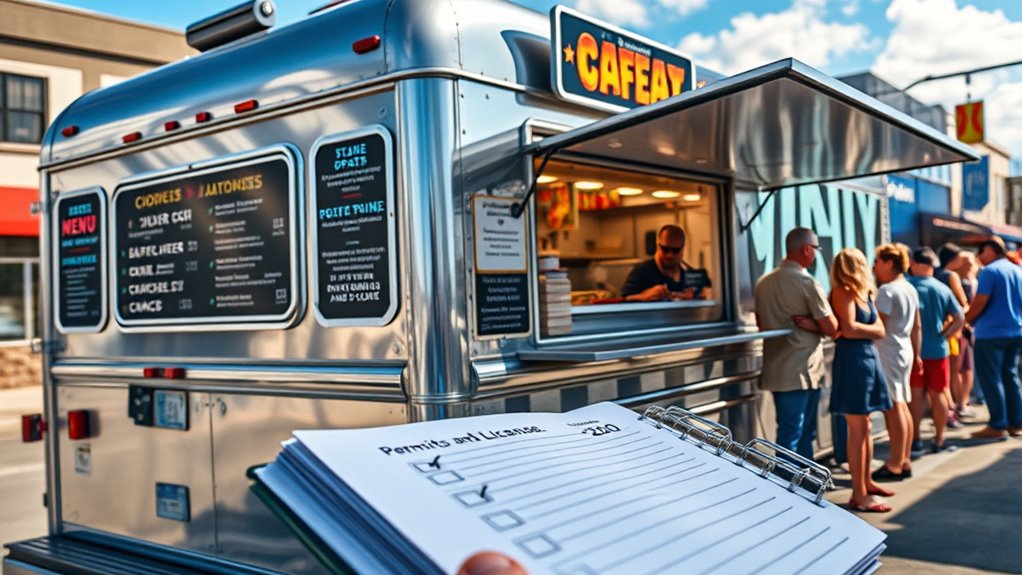
Crafting a menu for your food truck in Minot requires careful attention to both regulations and customer preferences. You need to guarantee your menu complies with North Dakota Food Code, focusing on foods that can be safely prepared with onboard equipment. Avoid items needing commercial kitchen prep if relying on cottage food laws. Clear labeling of allergens and ingredients is essential for legal compliance and customer trust. To succeed, consider these key points:
- Focus on safe, low-risk foods suitable for mobile service.
- Keep your menu concise to streamline operations and maintain safety.
- Highlight local flavors and dietary options to attract diverse customers.
- Price items thoughtfully, balancing ingredient costs and market demand.
- Incorporate attention into your menu planning process to enhance creativity and ensure adaptability for customer preferences.
This approach helps meet regulatory standards while appealing to customer tastes.
Effective Marketing Strategies for Food Truck Success

Effective marketing is essential for your food truck to stand out and attract a steady stream of customers in Minot. Leveraging social media platforms, especially Facebook, can boost sales by 20% and encourage customers to spend about 15% more per visit. Regular updates, targeted ads, and GPS tracking make your truck more discoverable and accessible. Participating in local events and festivals, like street fairs and cultural celebrations, exposes your brand to diverse audiences and fosters direct engagement. Building customer loyalty through loyalty programs, email marketing, and personalized discounts increases repeat visits and customer lifetime value. Additionally, using data analytics and mobile tech helps optimize marketing efforts, revealing peak hours and popular locations. Tailoring content for Millennials and Gen Z ensures you connect with your primary audience effectively. According to industry data, 80% of food trucks participate in at least 3 festivals or events annually to boost visibility, further amplifying your marketing reach. Incorporating electric heated mattress pads into your comfort offerings at your food truck’s nearby rest areas can improve customer experience, encouraging longer stays and repeat visits.
Ensuring Compliance and Maintaining Your Business
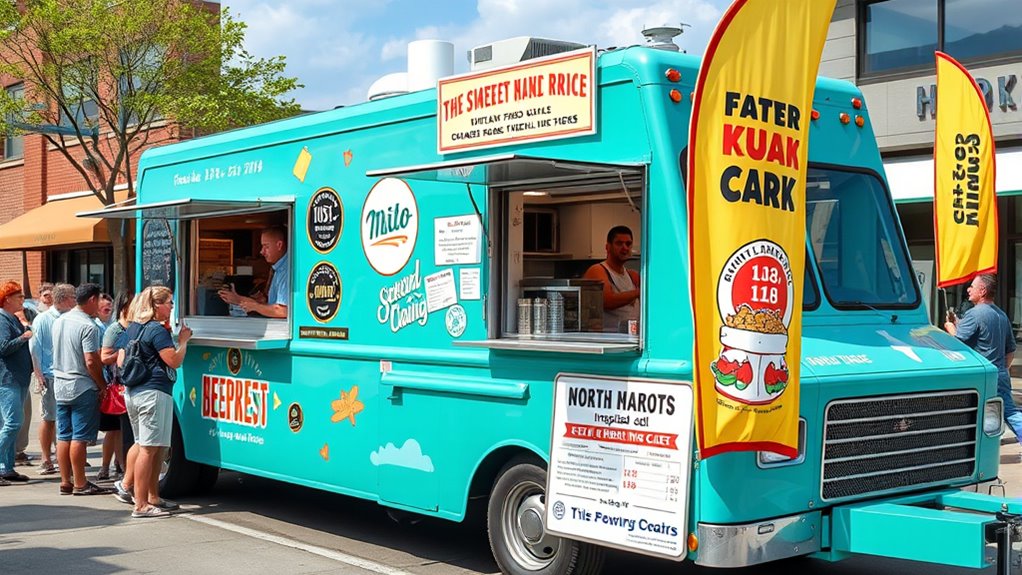
To keep your food truck running smoothly, you need to stay on top of regular inspections and make sure you meet all food safety standards. It’s also essential to keep your licenses and insurance up to date, so you avoid costly violations or shutdowns. Consistently reviewing these areas helps protect your business and keeps you compliant with local and state regulations. Being aware of cheating behaviors and maintaining integrity in your operations can also foster trust with your customers and community.
Regular Inspection Protocols
Regular inspection protocols are critical for ensuring your food truck remains compliant with health standards and continues to operate smoothly. These inspections, conducted by the First District Health Unit, help verify your adherence to safety and sanitation rules. You’ll face pre-operational inspections before opening and regular, often unpredictable, checks during operations. If complaints or violations occur, the inspection frequency increases. To stay compliant, you must:
- Keep proof of your mobile food license visible at all times.
- Ensure employees carry documentation of approved food safety training.
- Maintain liability insurance certificates with Minot as additional insured.
- Record and retain inspection reports, correction notices, and compliance documentation.
Staying proactive and organized helps you pass inspections smoothly and avoid penalties, keeping your business running without interruption.
Adhering to Food Safety Standards
Adhering to food safety standards is vital for keeping your food truck compliant with North Dakota regulations and ensuring customer safety. You must guarantee employees complete an approved food safety course, with proof available for inspections. Regular updates and refresher training help maintain high standards for handling, preparation, and sanitation. Personal hygiene protocols, like frequent handwashing, clean uniforms, and glove use, are essential. You need to source food from approved suppliers, store it correctly, and prevent cross-contamination by cleaning surfaces regularly. Mobile food units require licensing, adherence to fire and sanitation codes, and often use commissaries for cleaning and prep. Keep detailed records of training, temperature logs, and inspections to demonstrate compliance and support smooth operations during health checks. Implementing proper sanitation procedures is also crucial for maintaining a safe environment and preventing foodborne illnesses.
Insurance and Licensing Updates
Maintaining proper insurance coverage and staying current with licensing requirements are key steps to keeping your food truck compliant and operating smoothly in North Dakota. Failing to do so can lead to fines, suspension, or shutdowns. To stay on track, consider these points:
- Ensure your vehicle has liability insurance meeting minimum state requirements—$25,000 per person, $50,000 per accident, plus $25,000 property damage.
- Keep your vehicle registration and health permits up to date by checking with local agencies regularly.
- Review and renew licenses periodically to avoid lapses, especially as local policies may change.
- Obtain optional coverages like product liability, cyber liability, or trailer insurance for exhaustive protection.
- Remember that commercial auto insurance is mandatory for business vehicles in North Dakota, including food trucks, to cover work-related activities and protect against legal and financial risks. Commercial auto insurance is essential for safeguarding your business assets and ensuring compliance with state laws.
Staying proactive with insurance and licensing helps safeguard your business and ensures smooth operation.
Frequently Asked Questions
Are There Specific Zoning Restrictions for Food Trucks in Residential Areas of Minot?
You’re right to wonder about zoning restrictions for food trucks in Minot’s residential areas. The zoning ordinance mainly supports single-family homes and neighborhood uses, with limited or no allowance for commercial mobile vendors. Operating a food truck in residential zones likely requires special permits and might be prohibited to protect residents’ peace. To be sure, check with the local planning department, as rules can vary and enforcement is strict.
How Do Weather Conditions Impact Food Truck Operation and Planning in Minot?
Did you know Minot sees about 47 inches of snow yearly? Weather impacts your food truck plans markedly—you’ll need extra insulation for freezing winter temperatures and strategies for short, dark winter days. Snow and ice can block access and increase costs for snow removal. Wind and fluctuating temperatures also affect customer comfort and equipment safety, so plan for weather-resistant setups and flexible schedules to keep your operation smooth year-round.
Can I Operate a Food Truck in Multiple Cities With One License in North Dakota?
You can’t operate a food truck in multiple North Dakota cities with just one license. Each city or county generally requires its own permits and licenses, and reciprocity doesn’t always apply. You’ll need to check local regulations and obtain separate licenses for each jurisdiction. Also, keep in mind that vehicle registration and insurance are separate from health permits, so staying compliant across multiple areas means managing multiple permits and adhering to different local rules.
What Are the Health Inspection Procedures and How Often Are They Conducted?
They say “prevention is better than cure,” and that’s true for health inspections. You’ll face unannounced visits typically twice a year, focusing on food safety, sanitation, employee training, and proper licensing. Inspectors verify compliance during normal business hours, ensuring your operation meets standards. More frequent inspections may occur if you handle higher-risk foods or receive complaints, so staying vigilant helps keep your food truck in good standing and your customers safe.
Are There Any Special Permits Needed for Alcohol Sales From Food Trucks in Minot?
You’ll need a specific alcohol sales permit to sell drinks from your food truck in Minot. First, apply for a city alcohol license through the online portal, which involves submitting forms, paying fees, and getting approval from city departments. Then, obtain a state liquor license from North Dakota’s licensing division. Remember, alcohol sales aren’t allowed in parks or certain public areas, and special event permits may be necessary for outside locations.
Conclusion
Starting your food truck in Minot is exciting, but remember, managing permits and costs is crucial. While your menu and marketing draw customers in, compliance keeps your business running smoothly. It’s easy to focus on flavors and sales, yet neglecting regulations can shut you down overnight. Balancing creativity with responsibility is your key to long-term success—because in the food truck world, thriving means mastering both the menu and the paperwork.
